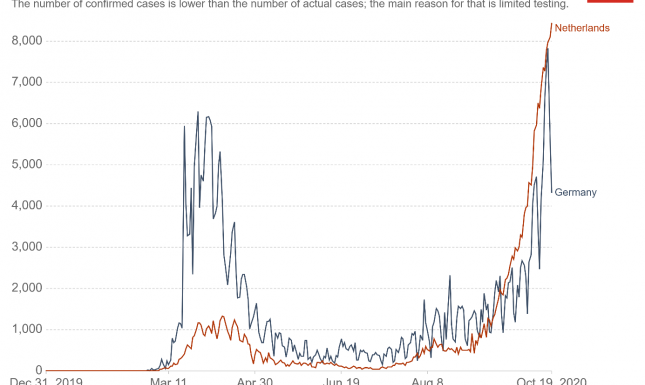Dutch superiority the cause of so many Covid-19 infections?
Some people, including medical experts and politicians, imply that Dutch superiority causes so many Covid-19 infections. Erik Bähre reflects on the nationalist rhetoric that prevents the Netherlands from learning from other countries and undermines the legitimacy of democracy and human rights.
The Netherlands has become one of Europe’s biggest Covid-19 hotspots and many are asking why. What is startling is that the explanations for this, given by many health experts and politicians, actually unmask the many faces of Dutch nationalism. During the first wave of the disease, medical specialists and policy-makers regularly implied that strict measures were not necessary because the superior character of the Dutch would enable them to ‘do the right thing’. They told journalists that the Dutch were a responsible people, unlike southern Europeans who misbehaved and therefore needed stricter policing (see also this blog). Dutch prime minister, Mark Rutte, continues to argue along these lines by pointing out that stricter measures are not necessary as long as we behave as sensible adults. At a national press conference, he stated: ‘I am not going to beg society to do something… This is a conversation between adults.’ Even during the second Corona virus wave, he routinely treats restrictions as a kind of punishment for misbehaviour.
Notwithstanding the rapid spread of the pandemic across the country, notions of Dutch superiority continue to hold sway, albeit in a different form. To put it bluntly, this ‘second wave’ discourse states that the Dutch are not doing well because of their superior treatment of democracy and human rights and because of their superior character. The high incidence of Corona virus infections is presented as a consequence of our exceptional concern with human rights and privacy. Let me give some examples.
Superior to other countries
During the second wave of Covid-19 infections, the idea of Dutch superiority was expressed in specific comparisons with China and Germany. The Dutch government created an app to trace Corona infections, which was stalled for several months due to privacy and other human rights issues. In everyday conversations about the app and the delay, people routinely pointed out that the app was difficult to put to use because the Dutch respect human rights. People regularly told me that if The Netherlands was more like China, the issue would have been resolved much faster. Such conversations did not question whether investing in an app was the right strategy, neither did they discuss other democratic countries with good human rights records – for example, South Korea – who, incidentally, has been better at controlling their second wave pandemic than The Netherlands. Instead, the problem is simplified as a human rights issue.
Number of new daily COVID-19 cases in The Netherlands and Germany

Comparisons are also repeatedly made between The Netherlands and Germany. At this moment, the number of daily infections in The Netherlands is approximately the same as Germany. This is high considering that the population of Germany is five times larger. Here too, Dutch superiority is used to explain failure. The common stereotype of obedient Germans was particularly used during a debate on national TV. Prime minister Mark Rutte said that making face masks obligatory would turn us into a childish country, again appealing to adult behaviour. In the TV studio, the leading Dutch virologist and influenza expert, Ab Osterhaus, agreed. He argued that the Dutch have liberal values and cherish the freedom to not follow rules – rules that, in this case, do not even exist. Germans, he compared, are complacent and obedient. Thus, a difference in policy (Germany requires masks while The Netherlands generally does not) was reframed as national superiority. Ab Osterhaus and other health experts argue that the Dutch value freedom and are fortunately not as obedient as the Germans, which explains why Corona virus rates in The Netherlands are so much higher than in Germany.
Protection against Islam?
Another touted example of Dutch superiority is formulated against Islam. This contrast revolves around wearing face masks and the number of COVID-19 patients that have a migrant or Muslim background.
At the moment, wearing a face mask is recommended, not required, when entering public buildings (there are some exceptions). Schools, stores, or churches can make their own decisions about how to deal with this recommendation.
In casual conversations, people sometimes explain that they do not want to wear a face mask because it reminds them of a burqa, a comparison that is particularly poignant in light of the recent ‘burqa ban’. Since 2019, legal restrictions have been imposed against wearing a burqa and other face covering devises in certain public areas such as hospitals and government buildings. A gentleman who never wears a face mask told me that the ban was a manifestation of Dutch liberal values that had to be protected. He explained: ‘After all, we have a burqa ban for a reason. We do not want to hide our face. It is not part of our culture’. This conversation did not consider wearing a face mask as a way to prevent oneself and others from being infected with a potentially devastating virus, nor did it appeal to notions of citizenship and taking responsibility. Instead, wearing a mask was seen as undermining Dutch values and liberties and giving in to Islamic-like values.
Geert Wilders, the founder and leader of the right-wing populist and nationalist Party for Freedom (PVV) aggressively blamed Muslims who ‘do not give a damn’ for causing a health crisis at the expense of what he sees as proper Dutch citizens. In some parts of The Netherlands, most notably Amsterdam, there is a relatively high number of COVID-19 hospital patients with Muslim backgrounds.
The most recent opinion polls show that Wilders’ Party for Freedom is the second most popular party in The Netherlands. By blaming Muslims for an overburdened healthcare system, and by pitting the health of Dutch people against the health of Muslims, Wilders is successfully constructing and mobilizing a nationalist discourse that centres around COVID-19.
Delegitimizing human rights and democracy
The high incidence of Corona virus in The Netherlands has led to a ‘second wave’ discourse that again highlights Dutch superiority. The ‘first wave’ discourse said that we do not need strict measures to fight Corona because of our superior character. The ‘second wave’ discourse says that our superior character, our great democratic institutions and our respect for human rights explain why the virus is not being controlled. Even in the face of failure, the discourse on Dutch superiority continues, although in a somewhat altered form. There are many examples of how our so-called typical Dutch values and character traits are presented as actual obstacles to preventing the spread of COVID-19. The comparisons are chosen so that successful democratic countries with good human rights records are ignored. Their rhetoric galvanizes our superior Dutch character by comparing us to stereotypes of obedient and apathetic Germans – an image that can be partly traced back to popular ideas about Nazi Germany, or by warning us against Muslims who are out to destroy Dutch values and interests.
On October 13, in a national press conference that announced new Covid-19 measures, a journalist questioned prime minister Mark Rutte about his statements suggesting that Dutch behaviour and mentality are superior. His response was that he is not a sociologist that analyses society, and that he loves his country.
Simplistic comparisons and popular stereotypes stand in the way of learning from what other countries are doing. This nationalist discourse is doing nothing to help fight the global pandemic. It is rather like the many heads of Hydra that distract us from looking for real solutions to a health crisis that also has devastating economic, social and political consequences. When health experts and politicians routinely imply that failure is the consequence of Dutch superiority, they not only display a poor understanding of societal dynamics, but they also imply that democracy, human rights, and Muslims are obstacles to progress.
Acknowledgement
The research is part of the Moralising Misfortune project, principal investigator Erik Bähre, funded by the European Research Council (ERC) under the Horizon 2020 Research and Innovation Programme (Grant Agreement No. 682467).



2 Comments
Very well observed, I also think that in promoting this rhetoric of national superiority being the way to beat the virus it has brought out a falsehood that it can be combatted by 'staying strong' and continuing your life as 'normal', and by 'being an adult'. This has made space for a lack of (socially distanced) camaraderie and societal cohesion because it's always someone else's fault for not acting in the way outlined formerly.
Goed artikel. Wij zijn een stronteigenwijs volk, vaak op het domme af. Laten we eens een voorbeeld nemen aan de Denen, dan zou het er hier niet zo beroerd voor staan. Op naar een totale lock down met een avondklok, misschien helpt dat de Rfactor om te buigen.
Add a comment